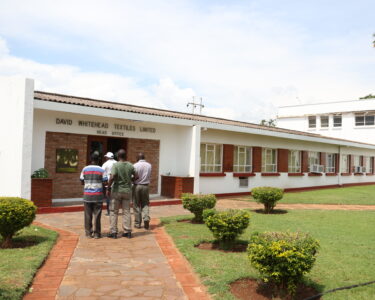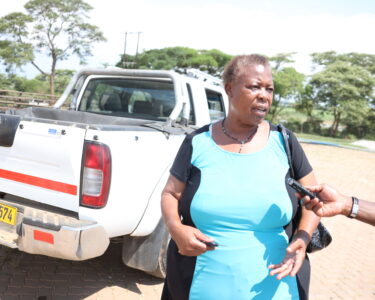Once upon a time, the Chegutu area of the Mashonaland West Province was home to a huge citrus industry. But no more. Now there are feverish attempts by both black and white farmers to resurrect it, and they are being supported by the Minister of State’s office in Chinhoyi, reports Baffour Ankomah.
Chegutu is not only known for gold. “There used to be massive citrus in this area,” Doug Kew, manager of the Sable Park Farm near Chegutu tells Brick by Brick. Though things have gone done considerably since the land reform programme of 2000, the citrus projects under the purview of a conglomeration of farms in the area – ie, Sable Park Farm, Dodhill Citrus, Corleinor Farm, and other upcoming citrus farms – still give joy to the managers of the Mashonaland West Province. “It’s a project of national interest” is how one official in Chinhoyi, the provincial capital, put it.
Even better, the citrus business in the Chegutu area incorporates a minority ethnic group whose members left the country en masse during the land reform programme – white Zimbabweans. But some of them are still well established in the Chegutu area and even helping black farmers to succeed in their agricultural ventures.
Doug Kew and Neville Stidolih like to describe themselves as “foot soldiers, not the big guys”. They are managers of Sable Park Farm and Dodhill Citrus/Corleinor Farm respectively who stood in for “the shareholders” and conducted a team of Brick by Brick editors on a tour of the Mashonaland West Province around the citrus business in the Chegutu area in mid-November.
The Minister of State’s office in Chinhoyi is keenly interested to see the once massive citrus business in the province return to its glory days, and supports the efforts being made by the white citrus farmers of Chegutu.
For visitors like the Brick by Brick editors, what catches the eye most is the enthusiasm of the white farmers. So we asked Stidolih what made them stay when other white farmers left the country in a huff during the land reform programme. His answer was sweet: “We were born and raised in Zimbabwe, and we thought there were still good opportunities for us here, and we want to work with Zimbabweans to build a better Zimbabwe.”
That “better Zimbabwe” means cooperation between black and white, especially among the citrus farmers of Chegutu. This pleases the Minister of State’s office in Chinhoyi and it is thus encouraging the white farmers to work with their black neighbours to make the Chegutu area a hub of citrus once again.
Kew and Stidolih showed the Brick by Brick editors around one area near Chegutu where five farms belonging to black farmers are being twinned with white farms to create a massive hub of citrus not far away from the Mupfure River whose waters are going to irrigate the farms. The area will soon become a special economic zone to give the farms and the farmers there special privileges.
According to Kew, the plan is “to draw in various landholders together because it makes sense to work together rather than everyone trying to do it individually. There is a discussion going on between the shareholders and the government to gain an economic zone status here … All the soils here are good for citrus. We want to create 500-hectare blocks of citrus and eventually put 1,000 hectares under citrus here, and even add more blocks in due course. It is going to become a very big citrus business in this area.”
Asked why the white farmers are so keen to work with their black neighbours, Kew responded: “It’s the future, that’s the only way to make agriculture work. Zimbabwe has got land assets that need to work. A piece of land lying idle does not do anything for anyone. If it is working it makes everyone’s life better.”
So, within the next 10 years or so, Chegutu will gradually see its glory years of citrus returning to confirm the efforts that its farmers – both black and white – are making today.
Big business
Worldwide, citrus is big business, which Zimbabwe must be able to tap into. Thankfully, some farmers in the Matabeleland South Province are doing just that. In November, Brick by Brick visited one farm 100 km from Gwanda where the black owner had put 2,000 hectares under citrus. It was great to behold.
Such efforts will ensure that Zimbabwe takes its rightful place in the citrus world in the near future, tugged along by its neighbour South Africa which currently is third in the world in citrus production.
Statistics show that South Africa has over 100,000 hectares under citrus while Zimbabwe’s production is just 1.5% of South Africa’s. Zimbabwe therefore has to up its game if it is to get a good share of the huge and lucrative global citrus market, which is currently dominated by Egypt and Spain at the top of the tree.
According to Stidolih: “Zimbabwe complements the South African citrus industry because our fruits mature 10 days to 2 weeks before the South African fruits mature. So it is a good opportunity for us to open the markets and get premium prices before the South African fruits come into the market.”
Tour of the farms
With driving rain beating on the roofs and sides of our cars, Kew and Stidolih drove us around the citrus farms. First stop: Corleinor Farm where Stidolih is in charge as manager. The farm employs a permanent staff of 50 and adds more temporary workers at harvest time.
This is a good and healthy farm of 110 hectares of citrus. Cooperation here means Corleinor Farm covers 4 neighbouring farms, one of which has really matured and has plans to expand over 500 hectares of citrus.
Corleinor Farm sells raw fruits locally, regionally, and internationally. In the 2022 season, it produced 3,500 tons of fruits from 67 hectares of productive orchards. Stidolih estimates that between 1,500 tons and 2,000 tons were exported regionally. “We didn’t do a lot internationally as in offshore Africa, and the remainder was taken up by the local market,” he told Brick by Brick.
“We also exported to the Middle East and Russia this season. We also had a Chinese delegation come here. They looked for industrial standards which we passed, and that market is now open to us, which we are excited about. We hope to export to China next season. It is a huge market,” Stidolih added.
In marketing their fruits, Corleinor Farm goes through an agent who does the international marketing for them. “We don’t market anything ourselves internationally,” Stidolih explained. “We go through an agent. We only do the local and regional stuff ourselves.”
Dodhill Citrus
On the outskirts of Chegutu is Dodhill Citrus which Stidolih also manages. It is made up of a nursery and a pack house with a US$300,000 state-of-the-art fruit packing machine.
In the glory years of citrus in Chegutu, Dodhill, which was established in 1986, had 6 pack houses. Today it has only one as its business was affected by the land reform programme. It moved to its current premises in 1993, and has a delightful restaurant on site where the great and good of Chegutu go to dine. As the restaurant is just off the Harare-Bulawayo highway, motorists who know about its delights also stop by.
Dodhill’s nursery covers a quarter of a hectare and has the capacity to populate 400 to 500 hectares with young plants. But now because the glory days are gone, the nursery can only populate 100 hectares or less. It starts from seed to transplantation, a process that normally takes 12 months to complete. “We propagate according to order,” says Stidolih. “As farmers buy different varieties, we propagate according to what they want.”
Dodhill employs 150 people, made up of predominantly women, because “it is a soft job and needs attention to detail”, said Cleves Denga, one of the black managers at Dodhill.
The major challenge facing the nursery is production costs. While the competition in South Africa produces a tree at US3.50 because of mechanisation and other factors, Dodhill does one tree at US$5, which makes Zimbabwean citrus farmers prefer to import trees from South Africa.
Worse for Dodhill, there is no import tax or duty for farmers importing citrus trees from South Africa, which makes the competition keener for Dodhill, which, according to Denga, “could put us out of business. That’s the main problem that we are facing”.
Stidolih added: “So it is cheaper for farmers to import trees from South Africa, through an auction system, than coming to buy from us, even though we have the trees here.”
Asked what the Zimbabwean government could do to help, Stidolih said: “Maybe something on the lines of a competition commission putting limitations on imports of trees that we can produce locally.”
Sable Park Farm
With the driving rain still beating down on the roofs and sides of our cars, Kew led the way to Sable Park Farm, which, at the midway of the journey, is developing a new hub of citrus in cooperation with black farmers.
Sable Farm has put in a new pipeline to draw water from the Mupfure river for irrigation in part of the special economic zone they are seeking. Kew explained that citrus was not a quick game. “You can’t put in a crop and expect rewards quickly. You’ve got to be here for a long time,” he said. “You start reaping fruits after 4 years and payback of the capital you sink in within 8 to 10 years. So citrus is a long-term crop, so we are investing for the future, and other farmers are coming on board.”
Kew talked about a bigger dam being “on the cards on the Mupfure River”. “As this project gains momentum, there is a big dam proposed for the Mupfure that will secure water to drive this citrus production,” he said. “There is a very good citrus climate here. There used to be massive citrus in this area, and the soils are still good for citrus.”
Sable Farm also has a pack house for citrus, and a huge chicken-breeding section. “Basically, the whole citrus project is underpinned by the chicken project,” Kew explained. “We’ve got a 99-year lease for the farm which has given us the confidence to drive this investment and incorporate the people around us.
“Our neighbours’ farms are going to be under citrus in due course. It will be watered by the dam on the Mupfure. In the meantime, a pipeline which comes from the Mupfure will fill our mini dam here. There is a need for two more of these dams. This will give us water security, which is one area the government could help by giving us water rights. Citrus is very different from wheat and maize. It is seasonal but if you let the water go, it dies,” Kew explained.
Sable Farm has already planted various varieties of citrus on its main farm in the first year of operations. Planting was still going on in the week the Brick by Brick visited the farm. “We are right at the beginning of the journey here,” Kew said as he showed us around the farm’s impressive pump house that will not only pump water for irrigation, but also liquid fertiliser to ensure that the citrus trees get all the nutrients they need to grow into a healthy farm.





